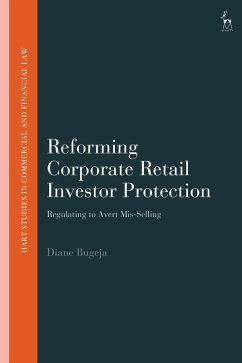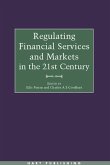The spate of mis-selling episodes that have plagued the financial services industries in recent years has caused widespread detriment to investors. Notwithstanding numerous regulatory interventions, curtailing the incidence of poor investment advice remains a challenge for regulators, particularly because these measures are taken in a 'fire-fighting' fashion without adequate consideration being given to the root causes of mis-selling.
Against this backdrop, this book focuses on the sale of complex investment products to corporate retail investors by drawing upon the widespread mis-selling of interest rate hedging products (IRHP) in the UK and beyond. It brings to the fore the relatively understudied field concerning the different degrees of investor protection mechanisms applicable to individual retail investors - as opposed to corporate retail investors - by taking stock of past regulatory reforms and forthcoming regulatory initiatives as well as, more importantly, the conclusions reached by the judiciary in IRHP mis-selling claims. The conclusions are particularly interesting: corporate retail investors are in a vulnerable position when compared to individual retail investors. The former are exposed to a heightened risk of mis-selling, meaning that regulatory intervention should be targeted accordingly. The recommendations made as a result of these findings are further supported by insights emerging from behavioural law and economic theories.
This book is aimed at researchers, lawyers and students with an interest in the financial regulation field who are keen to explore potential regulatory reforms to the investment services regime that address the root causes of mis-selling, and restore a level playing field amongst all retail investors.
Against this backdrop, this book focuses on the sale of complex investment products to corporate retail investors by drawing upon the widespread mis-selling of interest rate hedging products (IRHP) in the UK and beyond. It brings to the fore the relatively understudied field concerning the different degrees of investor protection mechanisms applicable to individual retail investors - as opposed to corporate retail investors - by taking stock of past regulatory reforms and forthcoming regulatory initiatives as well as, more importantly, the conclusions reached by the judiciary in IRHP mis-selling claims. The conclusions are particularly interesting: corporate retail investors are in a vulnerable position when compared to individual retail investors. The former are exposed to a heightened risk of mis-selling, meaning that regulatory intervention should be targeted accordingly. The recommendations made as a result of these findings are further supported by insights emerging from behavioural law and economic theories.
This book is aimed at researchers, lawyers and students with an interest in the financial regulation field who are keen to explore potential regulatory reforms to the investment services regime that address the root causes of mis-selling, and restore a level playing field amongst all retail investors.









